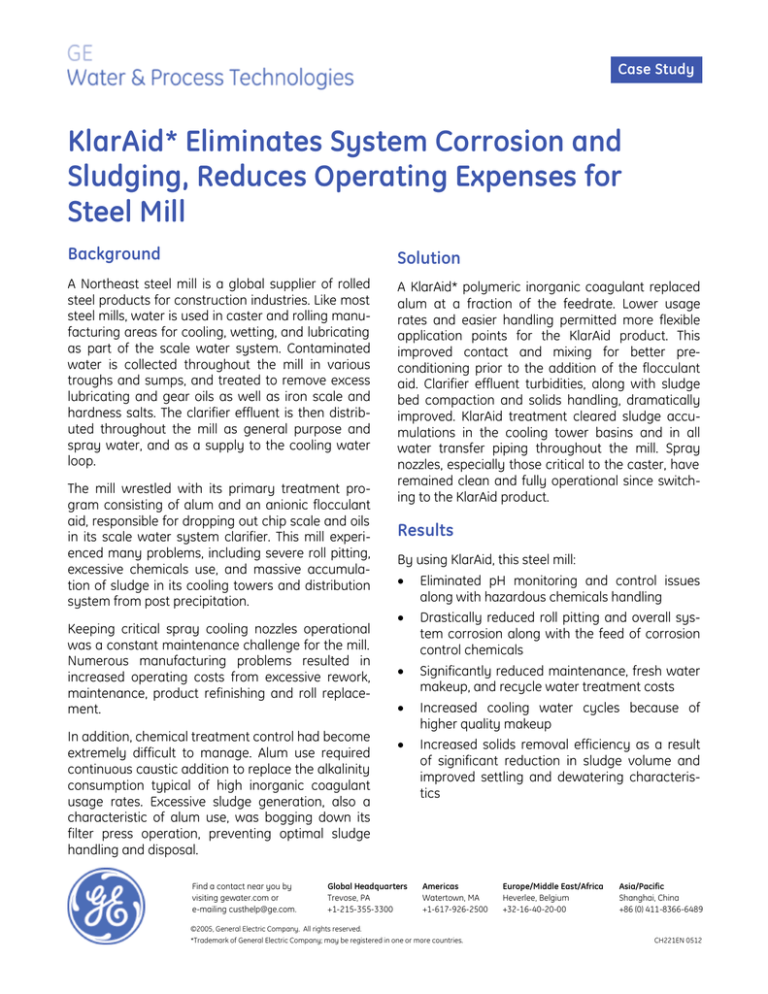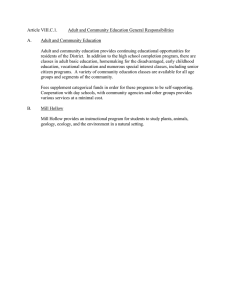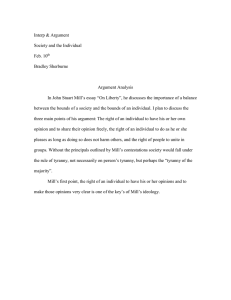
Case Study
KlarAid* Eliminates System Corrosion and
Sludging, Reduces Operating Expenses for
Steel Mill
Background
Solution
A Northeast steel mill is a global supplier of rolled
steel products for construction industries. Like most
steel mills, water is used in caster and rolling manufacturing areas for cooling, wetting, and lubricating
as part of the scale water system. Contaminated
water is collected throughout the mill in various
troughs and sumps, and treated to remove excess
lubricating and gear oils as well as iron scale and
hardness salts. The clarifier effluent is then distributed throughout the mill as general purpose and
spray water, and as a supply to the cooling water
loop.
A KlarAid* polymeric inorganic coagulant replaced
alum at a fraction of the feedrate. Lower usage
rates and easier handling permitted more flexible
application points for the KlarAid product. This
improved contact and mixing for better preconditioning prior to the addition of the flocculant
aid. Clarifier effluent turbidities, along with sludge
bed compaction and solids handling, dramatically
improved. KlarAid treatment cleared sludge accumulations in the cooling tower basins and in all
water transfer piping throughout the mill. Spray
nozzles, especially those critical to the caster, have
remained clean and fully operational since switching to the KlarAid product.
The mill wrestled with its primary treatment program consisting of alum and an anionic flocculant
aid, responsible for dropping out chip scale and oils
in its scale water system clarifier. This mill experienced many problems, including severe roll pitting,
excessive chemicals use, and massive accumulation of sludge in its cooling towers and distribution
system from post precipitation.
Keeping critical spray cooling nozzles operational
was a constant maintenance challenge for the mill.
Numerous manufacturing problems resulted in
increased operating costs from excessive rework,
maintenance, product refinishing and roll replacement.
In addition, chemical treatment control had become
extremely difficult to manage. Alum use required
continuous caustic addition to replace the alkalinity
consumption typical of high inorganic coagulant
usage rates. Excessive sludge generation, also a
characteristic of alum use, was bogging down its
filter press operation, preventing optimal sludge
handling and disposal.
Find a contact near you by
visiting gewater.com or
e-mailing custhelp@ge.com.
Results
By using KlarAid, this steel mill:
• Eliminated pH monitoring and control issues
along with hazardous chemicals handling
• Drastically reduced roll pitting and overall system corrosion along with the feed of corrosion
control chemicals
• Significantly reduced maintenance, fresh water
makeup, and recycle water treatment costs
•
•
Global Headquarters
Trevose, PA
+1-215-355-3300
Increased cooling water cycles because of
higher quality makeup
Increased solids removal efficiency as a result
of significant reduction in sludge volume and
improved settling and dewatering characteristics
Americas
Watertown, MA
+1-617-926-2500
©2005, General Electric Company. All rights reserved.
*Trademark of General Electric Company; may be registered in one or more countries.
Europe/Middle East/Africa
Heverlee, Belgium
+32-16-40-20-00
Asia/Pacific
Shanghai, China
+86 (0) 411-8366-6489
CH221EN 0512





